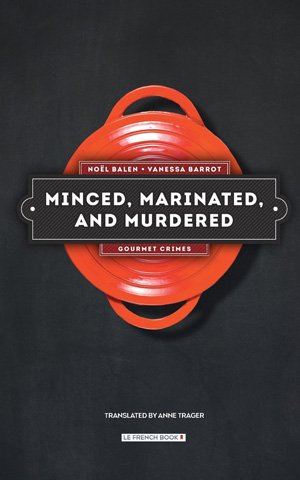
Noël Balen is a journalist and writer, well-known in France for his Winemaker Detective series which has become very popular on French TV as well. He co-writes the books with Jean-Pierre Alaux, and we’ve reviewed several editions in the past – most recently Requiem in Yquem. Now, publisher Le French Book is bringing out the English translation of a new venture by Balen. Minced, Marinated and Murdered is the first in the Gourmet Crime series which Balen has written with his wife, lawyer and inveterate foodie Vanessa Barrot. We wanted to ask the authors some questions to set the scene for the new series, which continues in Balen’s tradition of good food, good wine and a good mystery!
What are crime fiction lovers going to love about Minced, Marinated and Murdered?
The book offers crime fiction lovers a series of murders in a provincial town, prime territory for deductive sleuthing. Readers experience the emotion and reactions among inhabitants in and outside the restaurant profession. The police take the crime very seriously. The story’s heroine, a food writer, doesn’t have access to the case file, and she has to use her connections to find out more. In the end, it is her specialised knowledge and amateur investigatory skills that solve the crime. It is not her vocation to be a detective, and yet her natural curiosity and particular worldview come into play in each of the mystery novels in the series.
You are married and you also collaborate with other authors. Is it more difficult, or at the very least different, to work together as husband and wife?
Working together on a book is a real moment of complicity, almost a game. We always do the plot outline in the family kitchen. That’s our personal laboratory, the perfect place to plate up the intrigue, discuss the characters in depth, and let the whole story simmer for a while. Then we divide up the chapters according to our personal preferences for either the events or the characters described within. That’s when we part company and isolate ourselves, each one in our solitary writing world in our study. When each one of us has done their bit, then we exchange manuscripts and taste the offerings concocted by the other. Finally, we add our own secret sauce to create the novel we envisaged.
How did you decide to write a culinary series?
Noël created the Winemaker series and thought it would be a good idea to move from the cellar to the kitchen. These are two very different worlds: the Gourmet Crime series has at its heart a Parisian woman journalist. The settings are more urban, the style more dynamic. While we always maintain that atmosphere of pleasure, gourmet eating and tasting in our novels, the time pressures of the world of journalism create a different rhythm to the more stately wine-making enterprise.










